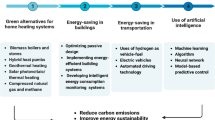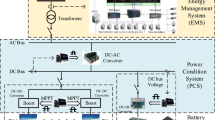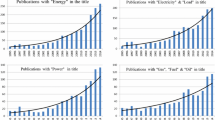Abstract
It has been widely recognized that the efficiency of a thermal power system can be improved by technological advancement of electricity generation and manipulation of electricity consumption. The smart meter enables two-way communication between the customers and the electricity generation system. The electricity generation system uses price incentive (i.e. a higher price in the peak period and a lower price in the off-peak period) to shift part of demands from peak to off-peak period under the smart grid environment. Given the fact that fuel consumption in each period is a strictly increasing convex function of power output, we propose two-period and multi-period pricing strategies, and study the effect of different pricing strategies on reducing fuel consumption.
Similar content being viewed by others
References
Acton, J.P. & Mitchell, B.M. (1981). The Effect of Time-of-Use Rates: Facts vs. Opinions. RAND Corporation, Santa Monica, CA 90406: RAND Report. Available at http://www.rand.org/pubs/reports/R2760.html.
Agrawal, V. & Ferguson, M. (2007). Optimal customized pricing in competitive settings. Journal of Revenue and Pricing Management 6: 212–228.
Baladi, S.M., Herriges, J.A. & Sweeney, T.J. (1998). Residential response to voluntary time-of-use electricity rates.Resource and Energy Economics, 20(3): 225–244.
Beckman, J.J.(1958). Decision and team problems in airline reservation. Econometrica, 26:134–145.
Boisvert, R., Cappers, P., Neenan, B & Scott, B. (2004). Industrial and Commercial Customer Response to Real Time Electricity Prices. Neenan Associates.
Borenstein, S. & Holland, S.P. (2003). Investment Efficiency in Competitive Electricity Markets with and without Time-Varying Retail Prices. Working Paper, Center for the Study of Energy Markets.
Caves, D.W. & Christensen, L.R. (1980). Econometric analysis of residential time-of-use electricity pricing experiments. Journal of Econometrics, 14(3): 287–306.
Centerpoint Energy. (2009a). Learn when you get your smart meter. Available at http://www.centerpointenergy.com.
Centerpoint Energy. (2009b). CenterPoint energy to receive $200 million federal stimulus grant to accelerate current smart meter project and begin building intelligent grid. Available at http://www.centerpoint-energy.com
Chao, H. (1983). Peak-load pricing and capacity planning with demand and supply uncertainty. Bell Journal of Economics, 14(1): 170–90.
Chen, B. & Hong, C. (1996). Optimum operation for a back-pressure cogeneration system under time-of-use rates. IEEE Transactions on Power Systems, 11(2): 1074–1082.
Cerisola, S., Ballo, A., Fernndez-Lpez, J.M., Ramos, A. & Gollmer, R. (2009). Stochastic power generation unit commitment in electricity markets. Operations Research, 57(1): 32–46.
Conejo, A.J., Morales, J.M. & Baringo, L. (2010). Real-time demand response model. IEEE Transactions on Smart Grid, 1(3): 236–242.
Crew, M.A. & Kleindorfer, P.R. (1978). Reliability and public utility pricing. American Economic Review, 68(1): 31–40.
Crew, M.A., Fernando, C. & Kleindorfer, P.R. (1995). The theory of peak-load pricing: A survey. Journal of Regulatory Economics, 8(3): 215–248.
Cross, R.G. (2001). Ressourcen erkennen-Umsatze steigern: Mit Revenue Management neue Einnahmequellen erschlieben. Wien, Frankfurt.
Earle, R.L. (2000). Demand elasticity in the california power exchange day-ahead market. The Electricity Journal, 13(8): 59–65.
Ham, J.C., Mountain, D.C. & Luke Chan, M.W.(1997). Time-of-use prices and electricity demand: allowing for selection bias in experimental data. Rand Journal of Economics, 28: 113–141.
Hartway, R., Price, S. & Woo, C.K. (1999). Smart meter, customer choice and profitable time-of-use rate option. Energy, 24: 895–903.
Eister, C., Higbie, J. & Koushik, D. (2012). Retail price optimization at InterContinental Hotels Group. Informs, 42(1):45–47.
El-Hawary, M.E. & Christensen, G.S. (1979). Optimal economic operation of electric power systems. Mathematics in Science and Engineering, Vol142.
Hormby, S., Morrison, J., Prashant, D, Meyers, M. & Tensa, T. (2010). Marriott International increases revenue by implementing a group pricing optimizer. Interfaces, 40(1): 47–57.
Irastorza, V. (2005). New metering enables simplified and more efficient rate structures. The Electricity Journal, 18(10): 53–61.
Joskow, P. & Tirole, J. (2004). Reliability and Competitive Electricity Markets. Center for the Study of Energy Markets.
Kimes, S.E. (2000). A Strategic Approach to Yield Management. In: Ingold, A., McMahon-Beattie, U., & Yeoman, I. (eds).: Yield Management for the Service Industries. London, 3–14.
Kleindorfer, P.R. & Fermando, C.S. (1993). Peak-load pricing and reliability under uncertainty. Journal of Regulatory Economics, 5(1): 5–23.
Kirschen, D.S., Strbac, G., Cumperayot, P. & de Paiva Mendes, D. (2000). Factoring the elasticity of demand in electricity prices. IEEE Transactions on Power Systems, 15(2): 612–617.
Lijesen, M.G. (2007). The real-time price elasticity of electricity. Energy Economics, 29(2): 249–258.
Owen, G. & Ward, J. (2006). Smart Meters: Commercial, Policy and Regulatory Drivers. London, Sustainability First.
Patrick, R.H. & Wolak, F.A. (2001). Estimating the customer-level demand for electricity under real-time market prices. NBER Working Papers 8213, National Bureau of Economic Research.
Samadi, P., Mohsenian-Rad A-H, Schober, R., Vincent, W.S., Wong & Jatskevich, J. (2010). Optimal Real-time Pricing Algorithm Based on Utility Maximization for Smart Grid. 2010 First IEEE International Conference on Smart Grid Communications, Gaithersburg, MD: 415–420.
Sasson, A.M. & Merrill, H.M. (1974). Some Applications of Optimization Techniques to Power Systems Problems. Proceedings of The IEEE, 62(7): 959–972.
Shiina, T. & Birge, J.R. (2004). Stochastic unit commitment problem. International Transactions in Operational Research, 11(1): 19–32.
Shoults, R.R. & Mead, M.M. (1984). Optimal estimation of piece-wise linear incremental cost curves for EDC. IEEE Transactions on Power Apparatus and Systems, 103(6): 1432–1438.
Steiner, P.O. (1957). Peak loads and efficient pricing. Quarterly Journal of Economics, 71: 585–610.
Takriti, S., Krasenbrink, B. & Wu, L. (2000). Incorporating fuel constraints and electricity spot prices into the stochastic unit commitment problem. Operations Research, 48(2): 268–280.
Talluri, K.T. & Van Ryzin, G.J. (2004). The theory and practice of revenue management. International Series in Operations Research & Management Science, 68. Kluwer Academic Publishers, Boston, MA.
Tscheulin, D.K. & Lindenmeier, J. (2003). Yield-Management-Ein State-of-the-Art. Z Betriebswirtschaft 73(6):629–662.
Turvey, R. (1968). Peak-load pricing. The Journal of Political Economy, 76(1): 101–113.
Valenzuela, J. & Mazumdar, M. (2003). Commitment of electric power generators under stochastic market prices. Operations Research, 51(6): 880–893.
Williamson, O.E. (1966). Peak load pricing and optimal capacity under indivisibility constraints. American Economic Review, 56(4):810–827.
Author information
Authors and Affiliations
Corresponding author
Additional information
Xiaoyan Xu received the Ph.D. degree in management science from University of Science and Technology of China (USTC) in 2006. She currently is a professor of School of Management, Zhejiang University. Her research interests include finance management and supply chain management. She has published academic paper in many journals, such as IEEE Transactions on Systems, Man, and Cybernetics, International Journal of Production Economics, Decision Support Systems.
Zhuang Ma received the Master degree in management science from Hefei University of Technology (HFUT) in 2005. He currently is studying for a doctorate in the University of Science and Technology of China (USTC). His research interests include service operations management and supply chain management.
Liang Xu received the Ph.D. degree in management science from the University of Science and Technology of China (USTC) in 2014. His research interests include service operations management and supply chain management.
Ye Lu received a Ph.D. degree in operations research from MIT in 2009, a Ph.D. degree in mathematics from the University of Notre Dame in 2006 and a Bachelor of Science degree in applied math from Tsinghua University in 2002. He currently is an assistant professor of Department of Management Sciences, City University of Hong Kong. His research interest includes supply chain management, revenue management, financial engineering and nonlinear optimization. He has published academic paper in many journals, such as Operations Research, Production and Operations Management, European Journal of Operational Research.
Rights and permissions
About this article
Cite this article
Xu, X., Ma, Z., Xu, L. et al. Optimal pricing strategy to reduce fuel consumption in electricity generation with smart meter. J. Syst. Sci. Syst. Eng. 24, 81–106 (2015). https://doi.org/10.1007/s11518-015-5265-1
Published:
Issue Date:
DOI: https://doi.org/10.1007/s11518-015-5265-1




